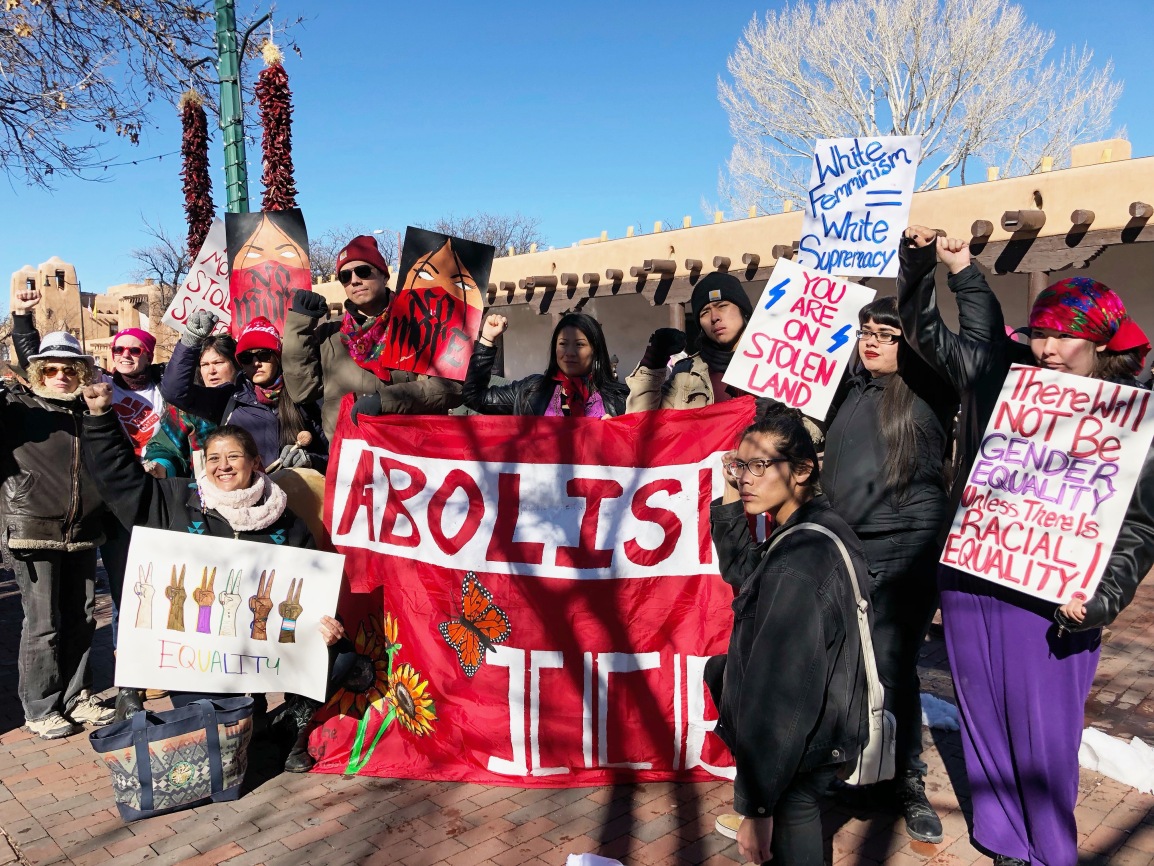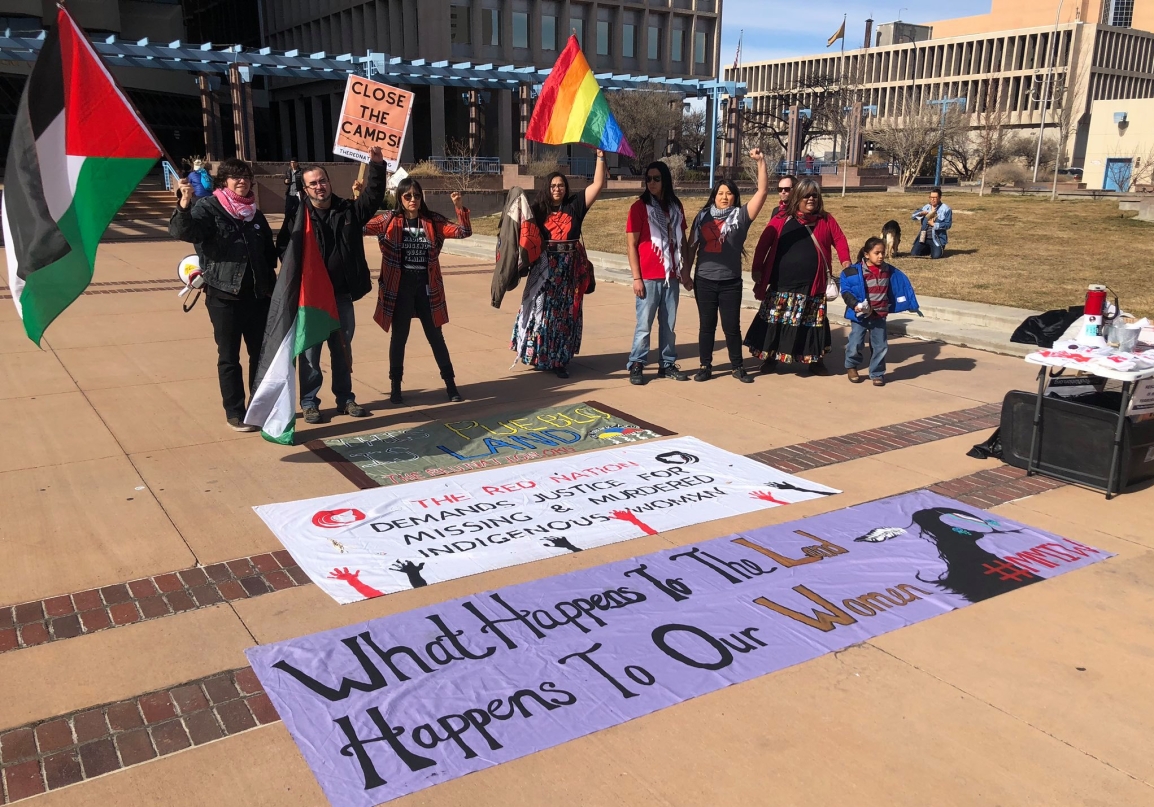
The Red Nation comrades at the 2019 Women’s March in downtown Santa Fe.
Santa Fe, 2019
Reflection by Elena Ortiz, The Red Nation
It was a bitterly cold January morning. The third annual Women’s March was underway in cities across the nation. Marchers had begun to stream into the plaza of the New Mexico State Capitol building (known locally as the roundhouse) in downtown Santa Fe. Ten or so The Red Nation members—all women and LGBTQ2+ relatives—arrived early to set up and lead chants as the crowd gathered.
As we were crossing the street to set up at the roundhouse, we were greeted by an older white man, sitting at a table full of pink pussy hats.
“You girls want a hat?”
That first interaction quickly and clearly illustrated the deep divide between the liberal feminism inherent in the Women’s March and the intersectional radical feminism practiced by The Red Nation.
“Not all women have pussies” we said.
“Not all of us identify as girls” we said.
“Not all pussies are pink” we said.
We continued on our way.
We found a good spot on the roundhouse plaza and began to unroll our banner and prepare ourselves for the march. We pulled out some sage to smudge and cleanse ourselves so that we could come right to the march.
Not five minutes into our smudging ceremony, a Hispano man came out of the roundhouse and told us we needed to stop.
“You need to be 25 feet away from the front entrance of the building to smoke” he said.
“We’re not smoking, we’re smudging, praying…” we said.
“You have to put it out right now” he said, raising his voice.
“We’re not going to put it out. We have every right to be here, doing this. You’re violating our religious freedom. We’re not moving. And we’re not putting it out” we said.
“Then you need to move 25 feet away from the entrance” he said with more aggression.
“We’re not moving. This is our land. This is Pueblo land” we said.
“You don’t have to give me attitude. This is a public place. You can’t smoke” he said with exasperation, taking a step closer.
“We’re not giving you attitude. You are the one with the attitude. And this is not public land. This is stolen land” we said as we began to form a line to protect the sage bundle from his potential assault and desecration.
He realized that he was not going to get his way and reluctantly retreated into the roundhouse, yelling and throwing his hands up in frustration.
As the man scurried away, we all laughed. The non-Native folx who had watched the whole interaction breathed a sigh of relief. There was not going to be a fight. No arrests today. Nor did we want to fight. We were simply smudging ourselves, quietly, even sharing the sacred smoke with non-Native folx who wanted to purify themselves too.
These folx observed but said nothing. They gave us nervous smiles of support and stood close to us as we gathered the crowd to hear our messages.
We always seem to make people nervous. They accuse us of being rowdy. Rebellious. Troublemakers. But that day, all we were doing was being Native on Native land. We weren’t yelling. We weren’t on the bullhorn. We weren’t throwing down in a confrontational direct action. We were just smudging ourselves. And eating doughnuts. And laughing.
We’re Native women on Native land. We don’t tolerate harassment or abuse from anyone, least of all men or settlers. As far as we’re concerned, we’re free ass Native people and we conduct ourselves as such.
We are reminded constantly at these types of “progressive” events that we are not welcome, that we don’t belong. That never changes. But this interaction clearly illustrates that, as Natives, we are considered ‘illegal’ on our own land. What we do, who we are, and our very presence is an offense to the colonizers. The space we claim must always be taken, it is never offered.
And we do claim presence on our own land. We claim the space denied us at the Women’s March in 2018. We claim brown pussies, no pussies, smudging, yelling, laughing, cursing. We claim the roundhouse, which was designed to mimic a Pueblo kiva. We claim the streets, we claim the plaza where our ancestors were executed by conquistadors for resisting Spanish invasion in the 17th century. We claim the hills and the mountains, the land upon which Santa Fe was built. We claim the sacred spring of O’gha Poo’ge (White Shell Water Place) as part of our ancestral homeland.
This is unceded Tewa land.
The Red Nation attended the 2019 Women’s March to bring attention the epidemic of Missing and Murdered Indigenous Women and Girls, or #MMIWG. We also demanded attention be paid to the link between the extractive industries and #MMIWG. This is a connection few of the other invited speakers dared to make. The type of liberal feminism practiced by most of the elite in Santa Fe does not dare to differentiate itself from the liberal democrats who have so recently taken power in New Mexico. Those same democrats who voted to fund and support ICE, those same democrats who support the extractive industries. At its heart, Santa Fe is a white liberal stronghold whose comfort level around Native people extends only as far as the plaza where our relatives sell their art and the museums populated with items stolen by the archaeologist graverobbers of the 19th and 20th centuries.
We also marched for our other-than-human relatives who suffer every day from human-caused climate change; we marched for our LGBTQ2+ relatives, who suffer extreme violence at the same rates as Native women; we marched for our southern relatives who are being detained and separated from their families at a border created on stolen land; we marched for our Palestinian relatives who suffer under unimaginable conditions as a result of the U.S. support of the apartheid state of Israel. In short, we marched because we cannot sit still in the face of all of this hate and injustice.
In Santa Fe, our culture is commodified and packaged. We are what we can create for the consumer market; the great engine of tourism that drives the economy of this state. But when we dare to speak up about the fracking on our land, the pollution emanating from LANL, the lack of appropriate education for our children, Native liberation, we become radicals, too hot to handle. Unwelcome on our own lands.
Troublemakers.
The Red Nation is unapologetic. We do not ask for permission to occupy space on our land. We know that brown faces in high places will not protect us. What we want for our people, for our communities, we must create ourselves.
Know this when you see us on the streets: we are who we are, and act the way we act, because we are free. Not because of the “rights” this colonial and misogynist society bestows upon us. We know the dirty secret underneath all that liberal talk about “rights:” Indigenous freedom makes you uncomfortable and you want us to go away.
That aint’ gonna happen.

The Red Nation comrades at the 2020 Women’s March in downtown Albuquerque.
Albuquerque, 2020
Speech delivered by Melanie Yazzie, The Red Nation
Good afternoon. I’d first like to thank Samia Assed for inviting me to speak here today. As some of you may know, Samia is on the board of directors for the National Women’s March. She is also a Palestinian woman. It’s no coincidence that a Palestinian woman invited a Diné woman to speak here today. Palestinians and the Indigenous people of Turtle Island have much in common. Our struggles for liberation and decolonization are premised on the same thing: the right of return. The return of Palestinians to their rightful homelands, now under occupation by Israel, and the return of Indigenous homelands to Indigenous nations, now under occupation by the United States.
You may be wondering why I, a Diné Indigenous woman, am starting my remarks by talking about Palestine. As I said above, Palestinians and Indigenous people have much in common. Our shared struggle is about the land. We struggle so that we may caretake the land and be in right relation with the land.
In order to caretake the land, we must have self-determination. Not the fictitious self-determination granted to us by colonial states, but true self-determination free from the plunder and poison that colonial states allow in the name of global capitalism and world domination. Israel has stolen Palestinian land to produce some of the world’s deadliest military technology, which is today being used to crush the mass movement that erupted last month in response to Modi’s anti-Muslim citizenship law in India. In what is now New Mexico, the United States stole Tiwa, Tewa, Diné, and Nde lands to produce the nuclear bomb and install touchstones of the U.S. military industrial complex like Intel, Sandia National Labs, and Kirtland Airforce Base.
Our lands are point zero for the death machine of war, imperialism, colonialism, and capitalism.
So what does this have to do with feminism? The liberation of Palestine and Turtle Island are at the heart of all our efforts to turn the tide of history. In a moment where our collective destiny—our very life and death— hinges on our ability to make connections between these seemingly separate issues, we must acknowledge that feminism is one of the best tools we have to forge the relationships necessary for building powerful mass movements that can encompass many demands and many people. Queer Indigenous feminists have long understood that we are stronger when we are growing in numbers and caretaking one another. As famed Dakota intellectual Ella Deloria once said, “I am not afraid, I have relatives.”
To be a good relative in this historical moment means to fight back. To fight for the right of Palestinian and Indigenous return. To fight for an end to U.S imperialism and all wars. To fight for a world beyond capitalism. On this day and always, we fight for this in the name of feminism.
Ahéhee’. Thank you.
Subscribe: